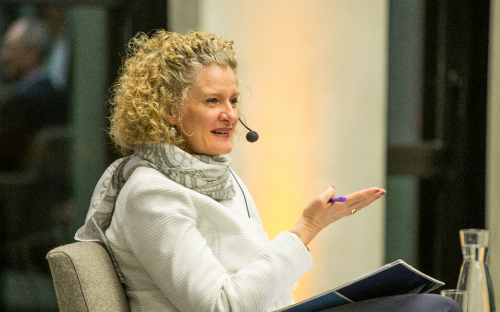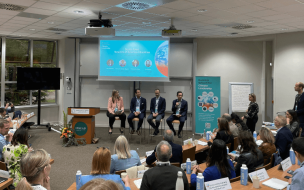Speaking to Barbara Stöttinger, dean for WU Executive Academy in Vienna, you are reminded of his perceptive words. "People think of disruption as some kind of nuisance," Barbara observes, "but disruption is constant, and business schools must look at the opportunities they hold."
As dean of WU Executive Academy, Barbara heads up one of Europe's largest business-focused universities, with around 22,000 students and over 2,000 faculty members.
The school has created a platform for exchanging ideas about how to manage disruptive trends, and is framing leadership modules along these lines.
Ranked in the top-60 programs of its kind by the Financial Times, WU Executive Academy's flagship Global Executive MBA leverages educational technology to create unique value propositions for students. The course is tailored for diverse, experienced professionals, and adopts a 'blended' approach to teaching.
"We are always pushed to sharpen our offer to students," Barbara says, "our methodology focuses not only on enhancing leadership skills, but also enabling transference of those skills to the real world."
Through the program's blended format, students spend time on campus, exchanging ideas at seminars, and building relationships with the rest of the cohort. "I think that's very important at the start," Barbara continues, "but afterwards, students learn through different online platforms. They are pushed and supported to apply bits and pieces of the course within a practical setting."
According to Barbara, "the Global Executive MBA represents the DNA of the school" with its emphasis on internationality and diversity. In a cohort of around 40 students, it is common to find 20 nationalities represented.
International residencies constitute an important component of the MBA. Students travel to Brazil, Chile, China, India, and the US, to experience the idiosyncrasies of doing business in each context.
Barbara explains that leading people and organizations while riding the waves of disruptive trends has never been an easy feat. "Some of us still remember when computers started to hit the workplace, and what that meant for a multitude of roles. We don't have to go back to the industrial revolution, we are continuously experiencing these innovations," she says.
What’s different today, Barbara says, is the increased pace of change and the growing complexity of such disruptive trends, combined with a precarious geopolitical climate.
In times of great pressure on leaders, it becomes important to speak of values. When Neil Armstrong flew to the moon, Barbara explains, he clearly needed the expertise to manage the technical aspects of flying a spaceship.
But such journeys also require creativity, self-reliance, courage, and resilience. Barbara believes that managers must foster such qualities to effectively lead teams, and the school aims to facilitate its students in adopting such characteristics. This enables them to manage disruptions and avoid vacuums of leadership.
RECAPTHA :
37
fa
80
9a







